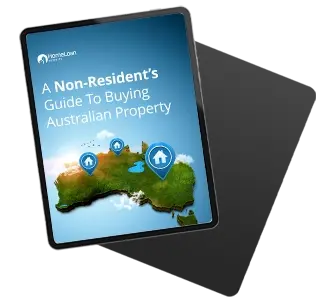Key Points
How much can I borrow? - Permanent residents living in Australia: Borrow up to 95% of the property value.
- Permanent residents living overseas: Borrow up to 80% of the property value.
- New Zealand citizens: Please refer to the New Zealand citizen page for qualifying criteria.
- Permanent residents living in Australia: Borrow up to 95% of the property value.
- Permanent residents living overseas: Borrow up to 80% of the property value.
- New Zealand citizens: Please refer to the New Zealand citizen page for qualifying criteria.
Will I get approved? - You must have an acceptable permanent resident visa.
- Foreign income is considered on a case by case basis depending on the nature and source of the income.
- Lending criteria for New Zealand citizens can vary between lenders and depending on your situation.
- You must have an acceptable permanent resident visa.
- Foreign income is considered on a case by case basis depending on the nature and source of the income.
- Lending criteria for New Zealand citizens can vary between lenders and depending on your situation.
What interest rates are available? Competitive rates are available. Please contact us to learn more.
Competitive rates are available. Please contact us to learn more.
Lenders available: Major lenders and specialist lenders
Major lenders and specialist lenders
Discover if you qualify: We can help you buy a property anywhere in Australia.
We can help you buy a property anywhere in Australia.
Permanent residents living overseas
Most lenders will not allow PR holders living outside of Australia to borrow but we have some lenders that consider this under their standard lending policies.
You must be able to prove your income and, in some cases, you may be required to hold a Power of Attorney (POA) in Australia.
Call us on 1300 889 743 or enquire online and one of our mortgage brokers can help you find a lender that can accept your situation.
Permanent residents with foreign income
Income that you earn from shares, property or businesses overseas can be used to help you repay a loan in Australia.
Some lenders can even advance your loan in a foreign currency so that you face less risk from exchange rate fluctuations!
However, not every lender accepts foreign income when assessing your ability to repay the debt. Please discuss this with us to find out if this is applicable to your situation.
Is Australian government approval required?
No, Foreign Investment Review Board approval is not required.
Home Guarantee Scheme Expands Eligibility For 2023-24
The federal government has announced changes to the Home Guarantee Scheme. The changes will greatly expand the number of people eligible to participate in the scheme. From 1 July 2023:
- Australian permanent residents are eligible to apply for all three schemes: First Home Guarantee, Regional First Home Guarantee and Family Home Guarantee.
- Friends, siblings and other groups of family members can jointly apply for the First Home Guarantee and Regional First Home Buyer Guarantee.
- Non-first-home buyers who have not owned property during the last 10 years can also apply.
- Borrowers who are single legal guardians of children – such as their aunts, uncles and grandparents – can apply for the Family Home Guarantee.
With the expansion of the eligibility criteria, owning a home could be within reach for many more buyers. To find out if you can apply, call us on 1300 889 743 or complete our free assessment form today.
Are first home benefits available?
The Australian government’s First Home Owners Grant (FHOG) and other benefits are available for permanent residents!
You should check with your specific as to what is available to you:
- NSW Office Of State Revenue Ph: 1300 130 624.
- QLD Office Of State Revenue Ph: 1300 300 734.
- State Revenue Office Victoria Ph: 13 21 61.
- ACT Revenue Office Ph: (02) 6207 0028.
- WA Department Of Finance Ph: 1300 363 211.
- Revenue SA Ph: (08) 8226 3750.
- NT Revenue Office Ph: 1300 305 353.
- TAS Department Of Treasury & Finance Ph: (03) 6233 2927.
Buying A Home in Australia As A Non-Resident
Everything you need to know as a non-resident buying a property in Australia.

Disclaimer: Over the next few days, you’ll receive additional guides to help you on your homebuying journey. Occasionally, you’ll receive carefully curated home-buying tips, offers & schemes, and news articles. You can unsubscribe any time you want. View our Privacy Policy
Does it matter which immigration visa I have?
All of the below visa types are acceptable for home loans! This is because they are assessed by Australian lenders in the same way that permanent residents are:
- Skilled – Sponsored (Migrant) Visa (Subclass 176)
- Independent Skilled Migration Visa
- State or Territory Nominated Independent Visa (STNI) (Subclass 137)
- Skilled Migrant – Australian Family Sponsored Visa
- Skilled Migrant – Regional (Designated Area) Family Sponsored Visa
- Distinguished Talent Migration Visa
- Independent Skilled Graduate Student Visa
- Skilled Graduate Student – Australian Family Sponsored Visa
- Skilled Graduate Student – Regional (Designated Area) Family Sponsored Migration Visa
- Independent Skilled New Zealand Citizen Migration Visa
- Skilled New Zealand Citizen – Australian Family Sponsored Visa
- Skilled New Zealand Citizen – Designated Area Family Sponsored Visa (Subclass 863)
- Skill Matching Scheme
- Australian Employer Nominated Migration Visa
- Regional Sponsored Migration Scheme visa (Subclasses 119 and 857)
- Labour Agreement Migration Visa
- Former Resident (Subclass 151)
- Skilled Independent Regional (Provisional) Visa (Subclass 495) – The SIR Visa
- Graduate Skilled Temporary Visa (Subclass 497)
- Business Owner (Residence) Visa (Subclass 890)
- State or Territory Sponsored Business Owner (Residence) Visa (Subclass 892)
- Investor (Residence) Visa (Subclass 891)
- State or Territory Sponsored Investor (Residence) Visa (Subclass 893)
- Business Talent (Permanent) visa (Subclass 132)
- Established Business in Australia (Subclass 845)
- Regional Established Business in Australia (Subclass 846)
- Partner visa (subclass 100)
- Prospective Marriage Partner – Fiancé
- Interdependent Partner Migration
- Parent visa (subclass 103)
- Aged Parent Migration – Class BP (Subclass 804)
- Aged Dependent Relative (Subclass 114 & 838)
- Remaining Relative (Subclass 115 & 835)
- Carer Visa (Subclass 116 & 836)
- Resident Return Visa
- Contributory Parent – Class CA (Subclass 143)
- Contributory Parent – Class DG (Subclass 864)
- Labour Agreement visa (Subclass 120)
- Employer Nomination Scheme visa (Subclasses 121 and 856)
- Distinguished Talent visa (Subclass 124)
- Distinguished Talent visa (Subclass 124)
- Skill Matching Visa (Subclass 134)
- Skilled Independent (Subclass 136)
- Skilled Australian Sponsored (Subclass 138)
- Skilled – Designated Area Sponsored (Subclass 139)
- Resident Return visa (Subclasses 155 and 157)
- Skilled — Independent (Subclass 175)
- Employer Nomination Scheme (Subclass 186)
- Regional Sponsored Migration Scheme visa (Subclass 187)
- Skilled Independent visa (Subclass 189) (Points-tested) stream
- Skilled Nominated visa (Subclass 190)
- Refugee visa (Subclass 200)
- In-country Special Humanitarian visa (Subclass 201)
- Emergency Rescue visa (Subclass 203)
- Woman at risk visa (Subclass 204)
- Woman at risk visa (Subclass 204)
- Labour Agreement visa (Subclass 855)
- Employer Nomination Scheme visa (Subclasses 121 and 856)
- Distinguished Talent visa (Subclass 858)
- Contributory Aged Parent visa (Subclass 864)
- Offshore – Resettlement Protection visa (Subclass 866)
- Skilled — Independent visa (Subclass 885)
- Skilled — Sponsored visa (Subclass 886)
- Skilled Regional visa (Subclass 887)
- Skilled Regional visa (Subclass 887)
- Business Innovation and Investment (Permanent) visa (Subclass 888)
Are you a significant investor (SIV 188 visa)?
The SIV 188 visa came into effect as a new stream within the Business Innovation and Investment (Provisional) (Subclass 188) and the Business Innovation and Investment (Permanent) (Subclass 888) visa on 24 November 2012.
Effectively, it allows high net worth (HNW) foreign investors to live in Australia for up to 4 years and 3 months, with the option to apply for the permament 188 visa.
We have more negotiating power with certain lenders for borrowers on the SIV visa.
For example, most lenders will only consider income in Australian Dollars (AUD). Others will accept foreign currency but will require that the majority of your income be the same as your country of residence.
With the Significant Investor Visa, some lenders may be willing to waive these requirements so you can qualify for a mortgage in Australia and grow your property portfolio.
If you are on a SIV 188 visa, call us on 1300 889 743 or complete our online enquiry form to start buying real estate in Australia.
Be careful of the foreign citizen stamp duty surcharge!
The foreign citizen stamp duty surcharge applies to all Australian states except for the Northern Territory (NT).
While it only usually applies to foreign citizens living overseas buying Australian real estate, new PR visa holders can sometimes get swept up in the surcharge if they don’t meet certain requirements.
For example, for some states like Queensland (QLD) and Victoria (VIC), you need to be in the country at the time of contract exchange to avoid the stamp duty surcharge.
However, in New South Wales (NSW) specifically, you need to be in the country for the contract exchange and settlement.
You can also be hit with the surcharge in select states if you’ve been in the country for less than 200 days since getting your PR visa.
Apply for a mortgage
Do you hold a 189, 190, 801 or another type of permanent resident visa?
We’re mortgage brokers who specialise in helping people without citizenship buy property in Australia. To find out how we can help you get approved for a permanent resident mortgage, please contact us on 1300 889 743 or enquire online today.
